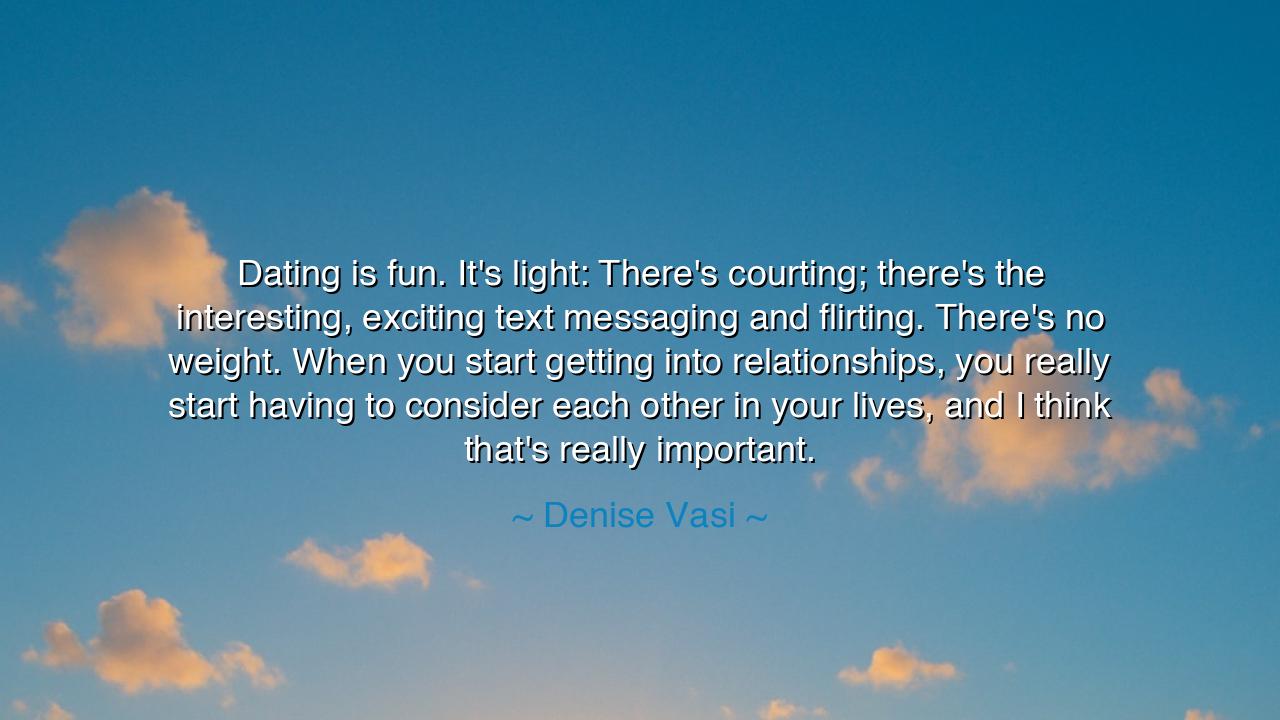
Dating is fun. It's light: There's courting; there's the
Dating is fun. It's light: There's courting; there's the interesting, exciting text messaging and flirting. There's no weight. When you start getting into relationships, you really start having to consider each other in your lives, and I think that's really important.






In the saying of Denise Vasi—“Dating is fun. It’s light: there’s courting; there’s the interesting, exciting text messaging and flirting. There’s no weight. When you start getting into relationships, you really start having to consider each other in your lives, and I think that’s really important.”—we hear the two tempos of the heart. The first is the bright drum of beginnings, when the wine is sweet, the moon is generous, and names are written like sparks in the night air. The second is the slow, steady beat of a shared march, when two travelers lace their burdens together and walk one road. Her words separate the lightness of the opening dance from the gravity of devotion, and they invite us to honor both without confusing one for the other.
In the elder tongues we might call the first tempo Eros-at-dawn—the realm of courting and flirting, of messages sent across the dark like little torches (text messaging is merely the modern courier of an ancient impulse). This is the garden gate, not yet the house; it is fun, a realm where laughter measures time and a glance can be a feast. There is no weight here because the vows are not yet bound; one’s days are still one’s own, and the heart, though awakened, remains mostly unencumbered. Such light delight is not trivial—it is the play by which souls introduce themselves before they attempt the heavy lift of living together.
But in the older books there is also Pragma, the seasoned love that builds walls against winter. This is where relationships truly begin: not in the spark but in the tending of the fire through rain. To be in a covenant is to consider each other not as ornaments but as coordinates—how the workday ends, where the parents live, what grief is being carried, which prayers are said at night. This is the apprenticeship of care. Here the word important does not thunder like a decree; it settles like bread on a table—daily, sustaining, quietly sacred.
Remember the tale of the philosopher Abelard and his beloved Heloise. Their first letters were the flirting of brilliant minds—quicksilver wit, a teacher and a pupil playing at the edge of flame. But history judged their earliest courting as only the prelude; the true measure of their bond was the long correspondence afterwards, when oceans of separation and sorrow required them to consider each other across decades. Their beginning was light; their endurance was weight. The ancients would say: love is proved not merely by the kiss under the archway, but by the bread sliced in the dim kitchen when storms lean on the roof.
A humbler story, close to our century: Mira, a night-shift nurse, met Jonas, a street guitarist, in the bright fun of a summer market. Their dating was radiant—late messages, shared cherries, the light promise of “soon.” Then winter came. Jonas’s mother fell ill; Mira’s schedule ground bones. The relationship began when calendar squares were negotiated like treaties, when rent had to be weighed, and when the song of one life had to harmonize with the fatigue of the other. They learned the grammar of “we”: who shops, who cooks, who listens when exhaustion makes speech difficult. The romance did not end; it matured. The weight arrived—and with it, a deeper joy that does not glitter, but glows.
Thus the quote teaches discernment. Let the gate be the gate and the house be the house. Rejoice in dating—its light, its courting, its bright flirting embroidered by text messaging—without demanding from it the solemn bread of covenant. And when you step into a relationship, step with reverence. The task is to consider each other: not to be consumed, but to be coordinated; not to be fused, but to be faithful. This, says the speaker, is truly important—not because gravity is more noble than levity, but because the seasons of love are sanctified when each is honored in its time.
The practical wisdom is simple and stern. First, practice truthful introductions: in the fun and light of dating, be clear about who you are and what you seek. Second, measure readiness: before you cross into relationship, ask whether you can share time, space, money, sorrow, and celebration—whether you can actually consider each other in decisions small and large. Third, build rituals that carry weight gently: weekly councils, shared budgets, calendars aligned, and apologies offered quickly and without pride.
Take, then, these actions: (1) Name your season—dating or relationship—and live it fully. (2) Keep a “care ledger”: one page for your needs, one for your partner’s, to remember how to consider each other. (3) Establish a rhythm—one playful rite (a flirtatious note, a spontaneous walk) and one steadfast rite (a planning hour, a gratitude check) every week. (4) When the weight grows heavy, lighten it together; when the light grows aimless, give it purpose. In this way, the beginning will keep its laughter, the covenant will keep its peace, and the journey of two will be both fun and important, as the ancients and the moderns together would bless it.






AAdministratorAdministrator
Welcome, honored guests. Please leave a comment, we will respond soon